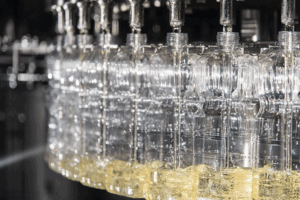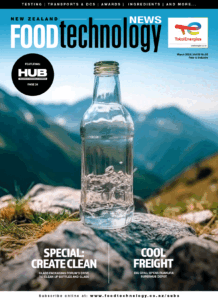
For producers, that means a new set of hygiene requirements for filling liquid food and for the manufacture and handling of containers. Clean and efficient processes are essential, as is low energy consumption. Krones has already made all of this a priority and offers the right process, plastics, and filling technologies. Technology from Krones can fill liquid foods of all viscosities, from low-viscosity products like salad dressings to high-viscosity ones like mayonnaise and mustard, or yoghurt with fruit chunks.
Filling with the utmost precision and hygiene
Like the product, the containers, too, must be sterilized and kept germ-free right up until the product comes into contact with the packaging. The Modulfill NWJ is often the filler of choice for precise, hygienic, and efficient filling of liquid food as it was specially designed and built for precisely this category. One special feature of the Modulfill NWJ is its filling valves, which close backwards to prevent any product dripping. The fill quantity is determined by way of load cells that are integrated into the valves. These load cells make it possible to achieve extreme precision in filling and in determining fill quantities – for any product regardless of its viscosity or conductivity.
Aseptic filling is often the best choice for achieving the necessary level of hygiene and to ensure a long product shelf life. Krones aseptic systems incorporate microbiology expertise and proven technologies. They provide either wet or dry sterilization, include a filler with either load cells or flow meters, and work in the high or low output range, all depending on the customer’s needs. Because of their incredible flexibility and reliability, they are used by fillers worldwide, delivering top-notch performance under a wide range of conditions.
Easy handling
Have you ever tried to pour ketchup out of a round bottle onto a plate? At first, nothing comes out. And then, all of a sudden, too much comes out all at once. By contrast, it’s much easier to squeeze just the right amount of ketchup from an oval-shaped plastic bottle. That’s why liquid food like ketchup is often filled into consumer-friendlier oval-shaped plastic bottles instead of cylindrical ones.
The challenge, though, lies in the details: Oval bottles have a long side and a short side. If they’re blow-molded from a preform heated in the standard way, the long sides would be thicker and the short sides very thin because they are further away from the stretching rod. Krones technology remedies this situation. “To achieve consistent wall thickness throughout, the preform is given a special temperature profile in the heating module,” explains Jochen Forsthoevel, product manager for plastics technology at Krones. “This selective tempering makes it possible to blow mold preforms to perfectly shaped containers.”
Adapted to product viscosity and formulation
Before filling comes the process technology: blending and preparing and possibly heating and pasteurizing the individual ingredients. “The challenge lies in adapting the process technology to the specific viscosity of the product and the individual recipe,” explains Olaf Drewelowsky of Milkron. For example, oils must be refined and filtered whereas grains used for making milk alternatives must be milled. “Krones engineering has got it covered.”
Juices or sauces: If it flows, Krones technology can fill it in glass, PET, or a combination of the two. Krones is a one-stop shop outfitting not only breweries and beverage bottlers but also food producers with everything from single stand-alone machines right through to turnkey factories.






























































































